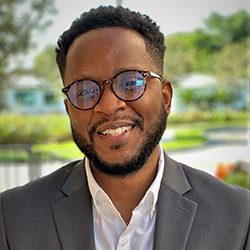 The industry event anyone in secured finance attends now celebrates its 77th year. SFNet is set to make the Arizona convention a memorable one. Click below to register.
The industry event anyone in secured finance attends now celebrates its 77th year. SFNet is set to make the Arizona convention a memorable one. Click below to register.

Dwight Clarke, CFE
Vice President, Asset Based Lending Consultants (ABLC)
40 Under 40 Category: External Field Exam
Dwight Clarke is vice president of Asset Based Lending Consultants (ABLC) and has been performing field examinations for over 19 years. ABLC is the oldest field examination outsourcing provider in business since 1986 and is an SFNet member. Dwight has handled due diligence work for different lenders globally, giving banks an in-depth picture of potential risks and rewards they may be taking on. Before becoming the vice president of ABLC, Dwight was an assistant controller for DeSears from 2008-2010 and an internal auditor for Appliance World Group from 2008-2010.
Dwight became a Certified Fraud Examiner (CFE) in January of 2020. He has also completed a Financial Management Program (2014) and Business Statistics Program (2020) at Cornell University. During the COVID-19 shutdown of 2020, Dwight completed certifications in: Follow the money: Trace concealed assets; Fraud against health care programs; Ten infamous fraud cases of the 21st century; Introduction to financial statement fraud; Data Analysis Techniques for Fraud Examiners; 10 Common Healthcare Fraud Schemes; Fighting Fraud in the Government and COVID-related Fraud Schemes.
Dwight is a second-generation asset-based lending service provider and the successor designate to his father, Donald Clarke, president/CEO of Asset Based Lending Consultants. Dwight is the exemplary 40 Under 40 professional and rising star in the ABL industry!
How do you define a good leader?
What defines a good leader, in my opinion, is someone who continues to learn no matter their current position. A person who continues to learn can stay sharp and healthy in and out of the office, leading to promotions, better networking, and professional development. Professional development can help you transform or take your company to a higher level by introducing you to new concepts and new ways of thinking. All these things trickle down to your lifestyle because it promotes self-worth and self-confidence.
Another attribute of a good leader is being self-aware, meaning they know their limits and strive to move beyond those limits. They do not let limitations stop them. They learn to move past those hurdles and continue to press forward.
Overall, a leader should stand out and always look for new opportunities to learn and move forward in life. An example of a good leader would be my father, Donald Clarke. Donald Clarke, a former SFNet and IFA instructor, has over 38 years in commercial lending, asset-based lending, commercial leasing, quality of earnings certification, and continuing education training courses focusing on corporate lending disciplines for global asset-based lenders and Fortune 500 companies.
What is the best professional advice you have been given, and how have you implemented it?
“I have two ears and one mouth” is the best professional advice I have received. It suggests that you should listen more than you speak. When done with intention, it will teach you how to communicate and be effective as you speak. An advantage to listening before you speak is that it allows you to get things right and not jump to conclusions.
In this ABL world, I have listened to my seniors on multiple occasions and received their feedback and constructive criticism to get where I am currently. I have implemented everything I have learned to move up in this business and continue to learn how to make it better. Listening and holding my tongue to speak has also motivated me to keep learning and processing, as the world changes day by day. I now pass the same advice to those who follow behind me, hoping that they will also listen before they speak to make moves and create opportunities that I wasn’t able to. As I mentor the up-and-coming ABL examiners, I try to communicate the importance of not being so quick to speak. It is not a race or a necessity to be the first to speak.
What advice do you normally give to the junior talent you mentor?
The advice I would give to junior talent I mentor would be to ask questions and be willing to take on new tasks.
Some people shy away from asking questions in fear of being judged or ridiculed, but you can never go wrong with asking questions. When you ask questions, the answers can validate what you were already thinking or help you to discover something new. Moreover, it lends itself to gain further insight that can help you put concepts together in a new way or better understand different perspectives; more importantly, the task at hand. Ultimately, you always want to approach tasks with a clear understanding of the goal and effectively complete it using existing and presented information.
Being willing to take on new tasks broadens your learning horizon; it is an opportunity to refine and enhance your skills. In addition to cultivating your skills, it can open doors to new opportunities. You will be in a position to build relationships that can further your career.
77th Annual Convention
 The industry event anyone in secured finance attends now celebrates its 77th year. SFNet is set to make the Arizona convention a memorable one. Click below to register.
The industry event anyone in secured finance attends now celebrates its 77th year. SFNet is set to make the Arizona convention a memorable one. Click below to register.
